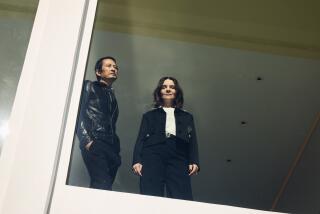Review: Divorce, French-style, in the gripping domestic drama ‘After Love’
Like most divorcing couples, the duo at the center of Joachim Lafosse’s “After Love” are in a kind of limbo. But for Marie and Boris, played to riveting perfection by Bérénice Bejo and Cédric Kahn, that state of emotional in-between is intensified by a particular set of financial circumstances: Until they agree on a monetary settlement for his share of their apartment, he can’t afford to move out.
And so the sunny home where they’ve been raising their daughters, and where almost all of the story unfolds, is not just the setting for a protracted conflict but, in certain ways, its essence. It embodies their class differences, which have taken on a labor vs. capital dynamic: Marie, an academic, was “born rich,” as Boris, a contractor with a perpetual cash-flow problem, likes to point out.
He insists, not unreasonably, that the renovations he did on the place that she bought (with help from her family) entitle him to half its value. Marie has reasonable expectations too — for starters, she’d like him to keep his day-to-day promises to their girls. But she can look spiteful when she tries to prevent her conciliation-minded mother (Marthe Keller) from hiring Boris to work on a house. She can barely remember what she ever adored about him.
And yet, even as these two cautiously navigate spaces they once shared — he’s relegated to a cramped corner room and has been assigned a separate shelf in the refrigerator — this keenly observed domestic drama is ever alert to the love that once bound them, just as their 8-year-old twins, delightfully played by Jade and Margaux Soentjens, take stock of every gesture and silence between them.
It’s in the characters’ gestures and glances that the movie’s action lies. Belgian director Lafosse, who scripted the story with three other writers — Mazarine Pingeo, Fanny Burdino and Thomas Van Zuylen — and further developed it through improvisation with the actors, is more interested in the moment-to-moment temperature shifts between Marie and Boris than in conventional plot points. Little “happens,” and when a late-in-the-proceedings emergency arises, it’s an unconvincing concession to capital-D drama.
By contrast, a simple dinner-party scene involving Marie, her invited friends and the unwanted Boris is a spectacular tour de force of passive aggressions and squirming discomfort, with a center-stage Kahn (a filmmaker and occasional actor) fearless in his truculence and vulnerability.
Bejo, best known stateside for her performance as the aptly named Peppy in “The Artist,” works here in a minor key to eloquent effect. She wields Marie’s constant anger as a self-protective shield and, in the rare moments when the hardened surface shatters, she taps into a deep well of sorrowful regret. In the role of the more loose-limbed and gregarious Boris, Kahn is a fascinating, ever-shifting composite of hope, delusion and wounded pride.
For American audiences, who generally don’t like to acknowledge the fiscal aspect of marriage — the prevalence of prenups and alimony notwithstanding — “After Love” is probably a more palatable title than the original, “L’Economie du Couple” (“The Couple’s Economy”). But if there’s something clinical about the French title, it also captures the idea of a marriage as a self-contained world.
In features that include “Private Property,” “Our Children” and “The White Knights,” Lafosse has explored the idea of the enclosed environments we create, within professions as well as families. Cinematographer Jean-François Hensgens, a frequent collaborator, moves fluidly through the rooms of Boris and Marie’s apartment as they and their girls reconfigure its spaces and try to imagine what lies ahead for them, outside those walls.
Though it doesn’t have quite the same sustained intensity, “After Love” often recalls “Shoot the Moon,” the great divorce drama starring Diane Keaton and Albert Finney. Messy and ungovernable at its strongest, Lafosse’s film is a story of heartbreak and real estate and, not least, money, viewed from within the still-smoldering ruins.
-------------
‘After Love’
In French with English subtitles
Not rated
Running time: 1 hour, 40 minutes
Playing: Laemmle Monica Film Center, Santa Monica
See the most-read stories in Entertainment this hour »
Movie Trailers
More to Read
Only good movies
Get the Indie Focus newsletter, Mark Olsen's weekly guide to the world of cinema.
You may occasionally receive promotional content from the Los Angeles Times.










